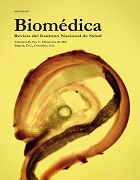Knowledge, attitudes and practices regarding malaria in the indigenous Guna population of the Madungandí region, Panamá, 2012
Abstract
Introduction: Knowledge, attitudes and practices surveys allow to determine the degree of knowledge on the management of malaria in a given population, as well as the attitudes and practices that contribute or not to its transmission.
Objective: To identify the knowledge, attitudes and practices that favor or not the transmission of malaria in the indigenous Guna population of Madungandí.
Materials and methods: A cross-sectional study was conducted by applying a survey to the heads of the families in a sample of 40% of households in three communities with high malaria incidence. Local Guna residents and translators were part of the research team that applied the questionnaires. The statistical analysis was performed in Epi-Info 6.04.
Results: The age range of those surveyed was between 20 and 70 years. All responders indicated that they belonged to and spoke the language of the Guna ethnic group, 64% were male and 30% were illiterate. Half (51%) of the responders declared they had suffered malaria at least once in the last eight years, and 89% accepted that malaria was a health problem. Sixty-three per cent responded that their traditional doctors, “inadule”, cured malaria and 7.0 % practiced the “pipe smoking” and “cocoa burn” rituals to prevent the disease.
Conclusion: Considering the limited knowledge about malaria and its vector, as well as the willingness to collaborate shown by the Guna population, it is essential to initiate educational and participative programs to improve control and prevention activities in the communities aimed at achieving a reduction in malaria incidence in the Madungandí indigenous region.
Downloads
Some similar items:
- Jefferson Antonio Buendía, Attitudes, knowledge and beliefs of patient about anti-hypertensive drugs , Biomedica: Vol. 32 No. 4 (2012)
- Karen López, Lilian Catalina Tartaglino, Ingrid Iris Steinhorst, María Soledad Santini, Oscar Daniel Salomon, Risk factors, representations and practices associated with emerging urban human visceral leishmaniasis in Posadas, Argentina , Biomedica: Vol. 36 (2016): Suplemento 1, Microbiología médica
- Beatriz Eugenia Alvarado, Alberto Alzate, Julio Cesar Mateus, Rocío Carvajal, Effects of an educational and participatory community intervention on malaria control in Buenaventura, Colombia , Biomedica: Vol. 26 No. 3 (2006)
- Celeny Ortiz, Guillermo L. Rúa-Uribe, Carlos A. Rojas, Knowledge, practices and entomological aspects of dengue in Medellín, Colombia: A comparative study of neighborhoods with high and low incidence , Biomedica: Vol. 38 No. Sup. 2 (2018): Suplemento 2, Medicina tropical
- Lisbeth A. Hurtado, José E. Calzada, Vanesa Pineda, Kadir González, Ana María Santamaría, Lorenzo Cáceres, Coridalia Wald, Azael Saldaña, Knowledge and risk factors related to Chagas’ disease in two Panamanian communities where Rhodnius pallescens is the main vector , Biomedica: Vol. 34 No. 2 (2014)
- Elsa Nieves, Néstor Villarreal, Maritza Rondón, Mireya Sánchez, José Carrero, Evaluation of knowledge and practice on tegumentary leishmaniasis in an endemic area of Venezuela , Biomedica: Vol. 28 No. 3 (2008)
- Edgar Alfonso, Álvaro Sanabria, Mario Castillo, Surgeons overestimate the risk of malignancy in thyroid nodules, evaluation of subjective estimates using a bayesian analysis , Biomedica: Vol. 31 No. 4 (2011)
- María Paula Sarmiento, Oliverio Suárez, Jesús Antonio Sanabria, Cristhian Eduardo Pérez, Laura del Pilar Cadena, María Eugenia Niño, Knowledge and practices about the prevention and the control of the influenza A H1N1 in the community of Floridablanca, Santander , Biomedica: Vol. 31 No. 1 (2011)
- Flor de María Cáceres-Manrique, Mary Lupe Angulo-Silva, Celmira Vesga-Gómez, Efficacy of the social mobilization and the social participation in dengue control measures , Biomedica: Vol. 30 No. 4 (2010)
- Liliana Quintero, Magda Beatriz López, Harold Ramírez, Jhon Carlos Castaño, Outbreak of malaria in an indigenous population living in an urban area of Armenia, Colombia, 2012 , Biomedica: Vol. 35 No. 1 (2015)
| Article metrics | |
|---|---|
| Abstract views | |
| Galley vies | |
| PDF Views | |
| HTML views | |
| Other views | |


























